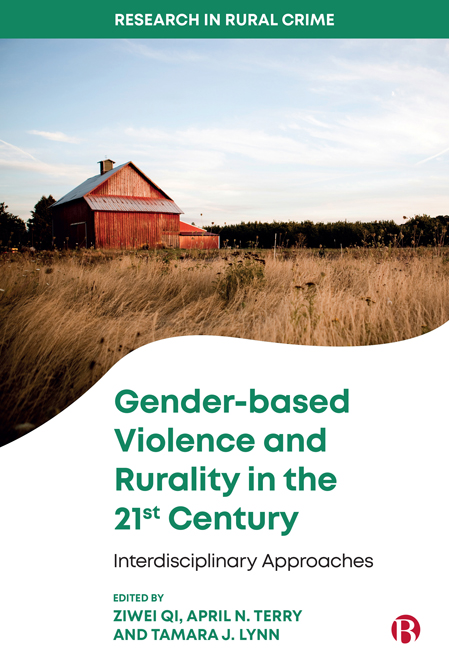Book contents
- Frontmatter
- Contents
- Series Preface
- List of Figures and Table
- List of Abbreviations
- Glossary
- Notes on Contributors
- Foreword
- 1 Understanding Rurality and Gender-based Violence
- PART I Rurality and Gender-based Violence
- PART II Beyond the Rural/Urban Divide: Critical Issues in Gender-based Violence
- PART III Access to Rural Justice: Economic Consequences and Policy Implications
- Index
1 - Understanding Rurality and Gender-based Violence
Published online by Cambridge University Press: 20 January 2024
- Frontmatter
- Contents
- Series Preface
- List of Figures and Table
- List of Abbreviations
- Glossary
- Notes on Contributors
- Foreword
- 1 Understanding Rurality and Gender-based Violence
- PART I Rurality and Gender-based Violence
- PART II Beyond the Rural/Urban Divide: Critical Issues in Gender-based Violence
- PART III Access to Rural Justice: Economic Consequences and Policy Implications
- Index
Summary
Despite a globally increasing urban population (it is projected that 68 per cent of the world population will reside in urban areas by 2050), the world's total rural population has grown steadily since 1950 with differing levels of urbanisation by country (United Nations, 2018). Take the United States (US) as an example – while most of the US population resides within urban areas, most places are classified as rural (U.S. Census Bureau, 2020). An estimated 19.3 per cent of the US population resides in rural communities, comprising 97 per cent of the total land area (Ratcliffe et al, 2016); yet most criminological literature has focused on densely populated areas, assuming rural places are simply miniature versions of urban culture. Most seminal criminological theories paved their way in the field by utilising urban samples (Donnermeyer et al, 2013) – many times, targeting the most extreme depictions of urbanisation (such as overcrowding, social inequality and racial oppression) (see Davis, 2007; Cobbina et al, 2008). This book challenges the belief that findings from urban studies can be applied to rural places as there is a disregard for space, place and time.
Gender-based violence (GBV) is a form of violence that includes physical, sexual, verbal, emotional and psychological abuse, as well as threats, coercion, and economic and educational deprivation. This violence is directed at persons based on their biological sex or gender identity and can occur in both public and private aspects of one's life (Ott, 2021). GBV is the most pervasive, yet least recognised, international human rights violation that impacts every element of victims’ lives (Johnson, 2010). This edited book recognises GBV as an umbrella term that encompasses the many types of direct and indirect abuses related to one's biological sex or gender identity. We also note that within this broader term, other conceptualisations of violence may be more appropriate and descriptive. For example, intimate partner violence (IPV) is specific to those who have, or are currently, engaged in an intimate relationship. Chapters may reference terms further by highlighting spousal abuse or domestic violence.
- Type
- Chapter
- Information
- Gender-based Violence and Rurality in the Twenty-first CenturyInterdisciplinary Approaches, pp. 1 - 14Publisher: Bristol University PressPrint publication year: 2023



